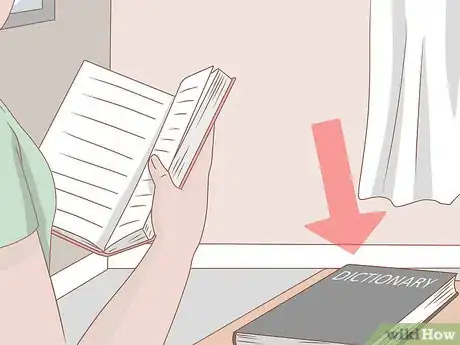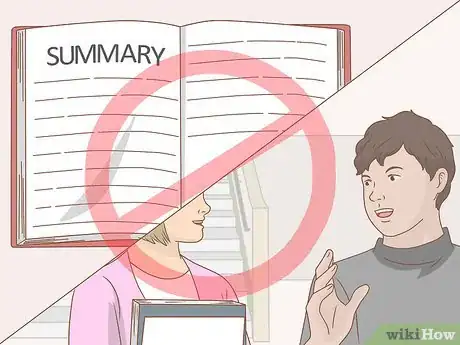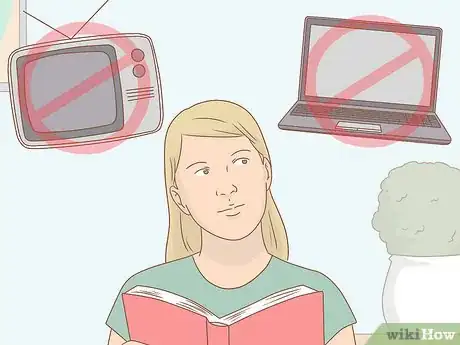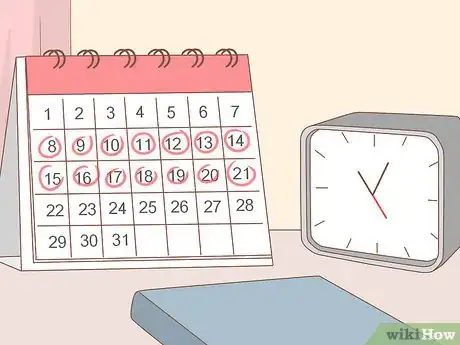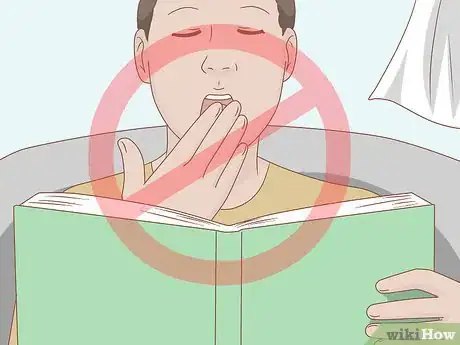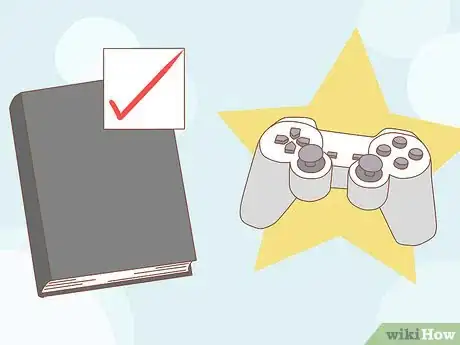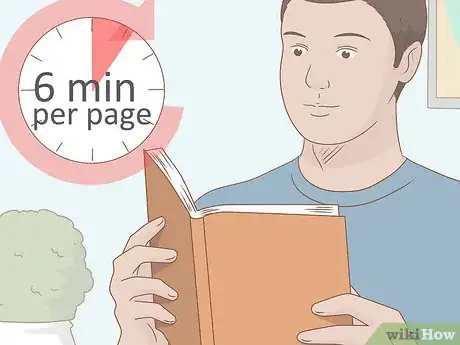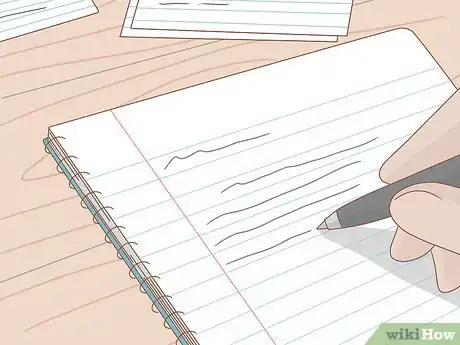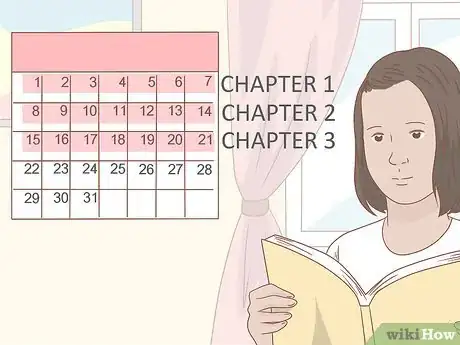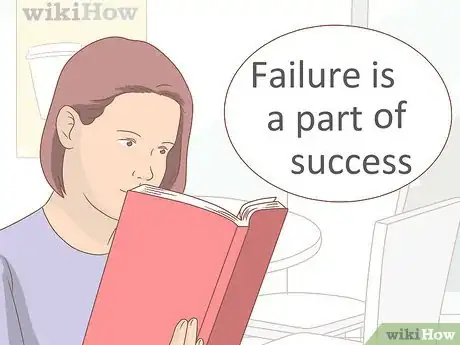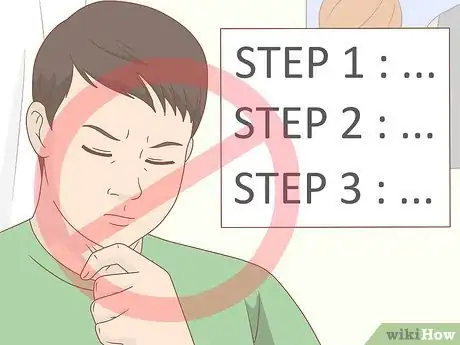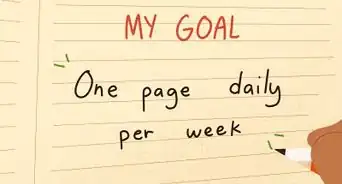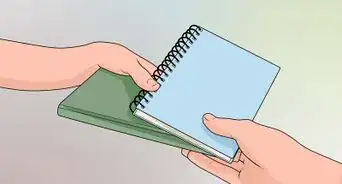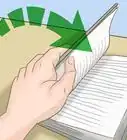This article was co-authored by Megan Morgan, PhD. Megan Morgan is a Graduate Program Academic Advisor in the School of Public & International Affairs at the University of Georgia. She earned her PhD in English from the University of Georgia in 2015.
There are 8 references cited in this article, which can be found at the bottom of the page.
This article has been viewed 51,623 times.
You know the drill. Someone asks you to read a book or chapter and you attempt to comply. Along the way you realize you have no desire to finish. The text may put you to sleep or may not make any sense to you. The writing may purposefully be in archaic English or in dry scientific jargon. Regardless, the task is the same--finish reading. With a good strategy you can finish reading the text before your malevolent ideas about what to do to the text win out.
Steps
Reading Literature for Class
-
1Start reading as soon as you can.[1] Few people can read a book in a single sitting. Starting to read in advance will help you pace your reading. This will allow you to limit the stress forcing yourself to read will have on you. If you start early you can give yourself breaks when you need them.
-
2Use supplemental materials when available.[2] Always keep a dictionary and thesaurus on hand when reading. Book and chapter summaries can help you remember what you forgot and highlight points you missed. These can help you when you get stuck or confused.Advertisement
-
3Resist summaries before finishing the text. If you are interested in what's going to happen in a story and you don't want to read it, resist reading a summary. Also, don't ask your friends what happens. Harness that interest in the story to inspire you to read. Once you hear a summary your interest in reading will sharply diminish. You may not finish reading at all and miss important details.
- Summaries are much more effective at helping you remember something you've already read. If you have already read the text and know what's going on, then detailed summaries can save you a lot of time.
- If you find the writing very difficult, like some people find old authors like Shakespeare, try reading a summary as you read the text. This will help you understand what's going on so you can focus more on the language.
-
4Eliminate distractions that slow you down. When you read something you don't like, distractions seem to pop up everywhere. Things that are rarely distracting become severe irritations. If you can avoid it, don't try to muscle through distractions. Move the distraction away or go somewhere you have no distractions.
- Don't try to "multitask" by having the TV or computer on while you're reading. You may think that you're getting more done, but your focus will be split and you won't get as much out of your reading.[3]
-
5Stick to a reading schedule. Even if you start early, you need to read at a steady pace to complete the book. Starting early lets you set your pace a little longer but with less daily reading. However, when you start getting behind, catching up can be a real chore. It may seem an insurmountable task. Keep up with your reading schedule at all costs.
- An easy way to figure your reading schedule is to divide the number of pages by the number of days you have to read the book. For example, if you have two weeks (14 days) to read a 300-page book, you'll need to read at least 21.5 pages a day if you read 7 days a week. However, if you don't want to have to read on the weekends, you'd need to read at least 30 pages a day.
- Schedule a specific time of day to read. Put it into your calendar or a planning app on your phone. Make an appointment with yourself to read, just like you would to go to class or see the dentist. Be faithful about "showing up" to read at your appointed time.[4]
- If you start getting behind, you may need to double or triple your reading for a day or two. Do this as soon as you miss a day. If you are very far behind, try doubling your reading for several days in a row rather than trying to catch up in one day.
- Be careful not to compare yourself to others if you read slower. This will only exacerbate your difficulty. Plan ahead so you can read at your own pace. If you want to joining a study group, consider finding a group that reads more at your pace.
-
6Read when you are fully awake.[5] If you are already tired, reading something you don't like will put you to sleep. If you are reading before bed you may find yourself sleeping on your open book. Falling asleep while reading robs you of time to read. It may also make you late for meetings or classes if you fall asleep during the day.
-
7Listen to an audiobook reading. This uses different senses to process the same information. When you hear an audiobook you will be listening to a story. You won't be forcing yourself to read. It is much more passive. If you get distracted, the reading will continue until you pause or stop it. This is especially helpful if you drive or commute long distances and can use your travel time to catch up on homework.
- It is tempting to multitask while listening to an audiobook. Be careful to continue listening to and following the story of the audiobook. Don't let yourself get too involved in a complex task. Focus on menial, mindless tasks so your mind can listen while you work.
-
8Plan to reward yourself when you finish. One of the worst things you can do is to let your reward for finishing be starting the next book on the list. Plan to reward yourself for your work accordingly. When you think about your next reading, then you can think about being that much closer to your reward.
- Try not to let your exam grades discourage you from reading. Thinking you will fail regardless may slow you down or inspire you to quit. Think of reading the book as an accomplishment in and of itself. Reward yourself for achieving your goal.
-
9Join a study group reading the same material.[6] It is helpful to join a group that is reading together. You may keep up with the readings so you don't get behind in the group. Even if you get behind, they may be more sympathetic than your teacher. They will also help clue you in to important topics and events to remember.
Reading Textbook Chapters
-
1Pace yourself according to how much you can process.[7] Allow yourself about 6 minutes per page when you plan your schedule. Consider only reading a portion a day if you have time. This will allow you to learn a little each day with fewer days of non-studying to forget what you learned.
- When you go back to reading, plan to review. Take a few minutes to look back at what you read previously to remind yourself what you learned last time. This will help you avoid getting stuck by forgetting previous material.
-
2Give yourself breaks to avoid burning out.[8] Proper pacing is incomplete without breaks to relax and recover. The last thing you want to do is push yourself beyond your limits. If you find your pacing is too quick, take a break. Work these breaks into your pacing if possible. Maybe take a day or two off during the week instead of reading every day.
-
3Focus on understanding rather than completeness. Sometimes what is important is not to read word-for-word but to understand the concepts. If you focus on reading word-for-word you may sometimes miss the overarching themes. Skim the material and focus on learning concepts and themes when possible.
-
4Take plenty of notes.[9] If you do not understand the material you will certainly grow to hate reading it. One of the best ways to avoid this is to take copious notes. Write out definitions and concepts. Memorize them in your spare time.
- Most textbooks will provide a Glossary with definitions for key terms and concepts. Use this Glossary whenever you run across a term you are unfamiliar with. If you find yourself forget that term frequently, make a flash card and quiz yourself until you know the term's meaning by heart.
-
5Discuss the material with classmates or study mates. Finding a study group can be a boon to your understanding in a class. Where you fail to understand a topic, they often can help you out. Likewise, when they do not understand, you can teach them. This will help both of you to better understand the material.
Reading Self-Help Books at Home
-
1Develop a sense of humility regarding the topic. Many people who find themselves unable to finish a self-help book believe they already know what's being said. If that were true, you wouldn't be asked to read the book. Even if you know the material, perhaps your execution is poor. Consider that you need a refresher course.
- Read about the author to discover their credentials. Most publishers won't waste money printing the work of a quack. Once you know where they are coming from you may be better able to appreciate what they are saying.
-
2Stick with a steady reading schedule. Depending on why you are reading the self-help book, you will likely have ample time to read it. Wait until you need to have it read "tomorrow" and you will likely be unsuccessful. Plan out your reading schedule so you won't have to read more than you can understand.
- Consider reading a chapter per week or each day. Most self-help books are read for understanding rather than pace. The goal is to learn the principles rather than finish the text.
-
3Practice the principles you are learning.[10] If you feel you are wasting your time with this book, you may benefit from practicing the principles. Practicing the principles in the book can give you real-world benefits that make the reading seem profitable.
- Write the principles you are learning on note cards. You can review those note cards throughout the day. This will help you remember to try to implement the principles throughout the day.
-
4Discuss what you are reading with others.[11] If you are reading for yourself, you may get a friend to join you. If you are reading for someone else (e.g., a spouse or counselor) you may want to discuss the book with them. Chances are that they will be very happy to help. Especially if they were the ones asking you to read the book in the first place.
-
5Don't stress about the instructions. Some self-help books end their chapters with homework. If you think reading the material is a chore, this extra work will probably infuriate you further. Focus on understanding the principles and skip the homework unless you think it will be interesting or enlightening.
- Some self-help books require some extra work. You likely don't have to complete all the recommended homework but don't skimp on what's important. If there are self-evaluations or tests on which other parts of the book rely, try to complete those. Instructions to write down your feelings or thoughts at the end of a chapter are often supplemental time-fillers you can ignore in a pinch.
Community Q&A
-
QuestionWhat if i have to read a textbook?
 Community AnswerJust get it over with. Make sure you understand the main idea and key points of the book.
Community AnswerJust get it over with. Make sure you understand the main idea and key points of the book.
References
- ↑ https://apstudent.collegeboard.org/apcourse/ap-english-literature-and-composition/reading-study-skills
- ↑ https://apstudent.collegeboard.org/apcourse/ap-english-literature-and-composition/reading-study-skills
- ↑ https://www.npr.org/2013/05/10/182861382/the-myth-of-multitasking
- ↑ https://success.oregonstate.edu/learning/reading
- ↑ https://eric.ed.gov/?id=ED522810
- ↑ https://cse.buffalo.edu/~rapaport/howtostudy.html
- ↑ https://cse.buffalo.edu/~rapaport/howtostudy.html
- ↑ https://www.fnu.edu/tips-preventing-student-burnout/
- ↑ https://learningcenter.unc.edu/tips-and-tools/taking-notes-while-reading/

